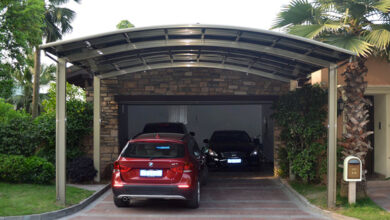
Asphalt vs. Concrete: What Are the Differences?
If you’ve been looking into redoing your driveway or parking lot area, you probably already know you have two main choices. Asphalt and concrete.
But aside from looks, is there really a difference?
Deciding between asphalt and concrete may not seem like a big deal, but the end result will affect the overall look of your home, and the differences in cost will be significant.
Plus, choosing the wrong one for your climate can have expensive consequences.
Here we’ll break down the pros and cons of asphalt vs. concrete.
Table of Contents
Appearance
Let’s start with the most obvious—appearance. The overall look of your home will vary dramatically depending on whether you choose asphalt or concrete.
With asphalt, you are limited to either grey or black, as asphalt doesn’t take well to staining or coloring. Many people like this look, and it provides a seamless transition from your driveway to most city streets, which are usually asphalt.
Concrete, on the other hand, can take on many colors and even be stamped or textured depending on the looking you desire.
And because there are so many concrete uses—it can be used to make columns or pillars—you can add additional features that match the aesthetic of your home.
Durability
Next, you’ll want to consider durability. Concrete is more durable but harder to repair. Cracks and potholes can’t be fixed without tearing up what’s remaining down to the ground and starting from scratch. But if well maintained, concrete can last for 40+ years and still look great.
Asphalt won’t last as long—on average asphalt driveways last 15-20 years—but repairs can be done quickly and cheaply. You may even be able to do many fixes yourself with this DIY asphalt guide.
Cost
Another major difference between asphalt and concrete is the cost.
One of the asphalt benefits is that is cheaper initially to install, roughly costing about 50% less than concrete. However, those savings are offset by the likelihood that you’ll be paying to do repairs more often due to asphalt’s inferior durability.
With concrete, the initial cost is higher—nearly twice the cost of asphalt! But since it’s more durable, you may save money in the long run if you live in the right climate for concrete.
With a higher initial investment, you’ll want to be sure you find a reputable service provider when looking for stamped concrete contractors.
Climate
In places that get extremely hot, asphalt can melt and ooze, sticking to tires and cracking as it cools. Not to mention, walking barefoot or touching hot asphalt can cause serious burns.
If you live in a hot climate and want to be able to play with your kids or walk the dog on the payment, concrete is the better choice.
In colder temperatures, concrete can crack and leave you with a difficult and costly repair. In this case, you’re better off going with asphalt, which does better with cold-temperature fluctuations.
Asphalt vs. Concrete: What Should You Choose?
What’s right for you is going to depend on several factors, including the climate where you live, your budget, and the overall look and feel you’re going for.
Make a “pros and cons” list, and determine whether asphalt vs. concrete is right for you. Check out our blog for the latest in Home and Lifestyle tips.








